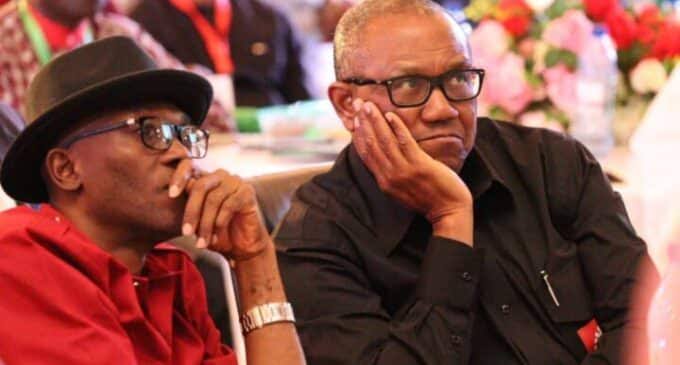The Labour Party (LP) has issued a public rebuke of its 2023 presidential candidate, Peter Obi, censuring him for what the party terms a calculated campaign of media-based defamation against its leadership. This admonition underscores the ongoing internal discord within the party, a rift that has escalated in recent weeks following public disagreements and accusations between Obi and the party’s national chairman, Julius Abure. The LP’s statement, delivered by National Secretary Alhaji Umar Farouk, specifically addresses Obi’s recent allegations during a televised interview, where he insinuated that the ruling All Progressives Congress (APC) had infiltrated the LP’s ranks to destabilize it from within.
Farouk vehemently denied these allegations, characterizing them as unsubstantiated and part of a larger pattern of Obi publicly targeting the party’s leadership, particularly Abure, without providing any concrete evidence. He challenged Obi to produce tangible proof of APC interference, emphasizing that Obi’s persistent public accusations are not only damaging to the party’s image but also based on unfounded claims. The statement highlights the irony of Obi’s accusations, given the unwavering support he received from the same leadership he now criticizes throughout the 2023 election cycle, including legal battles that reached the Supreme Court. Farouk argued that instead of taking responsibility for any perceived shortcomings in his leadership, Obi resorts to deflecting blame onto the party’s structure.
The core of the LP’s internal conflict, as laid out by Farouk, centers on what the party sees as a concerted effort by Obi and Abia State Governor Alex Otti – himself suspended from the LP for alleged anti-party activities – to undermine the established leadership. Farouk maintains that the APC plays no role in the LP’s internal issues, placing the responsibility squarely on Obi and Otti. He pointedly questioned Obi’s leadership, suggesting that a true leader acknowledges their failings instead of seeking scapegoats. The statement paints a picture of a party grappling with the aftermath of a closely contested election, struggling to maintain unity amidst internal power struggles and conflicting visions for its future.
Farouk underscored the unwavering support the party provided to Obi during the tumultuous election period, highlighting their steadfast loyalty in the face of challenges and a splinter group attempting to seize control of the party. He contrasted this loyalty with what he perceives as Obi’s current campaign of disparagement, which he characterizes as “blackmail.” The LP’s statement serves as a direct rebuttal to Obi’s narrative, framing his actions as an unwarranted attack on a leadership that consistently championed his candidacy. It depicts Obi as a leader who, having failed to secure the presidency, now seeks to shift the blame rather than accept responsibility for the outcome.
The LP’s statement also emphasizes its commitment to moving forward and rebuilding after the Supreme Court’s final verdict on the presidential election dispute. Farouk stressed the party’s focus on internal restructuring and healing, implying that Obi’s public pronouncements are counterproductive to these efforts. The statement subtly acknowledges the legitimacy of Abure’s leadership, pointing to Obi’s own recognition of Abure as the National Chairman during the very interview where he leveled the accusations. This, according to Farouk, undermines Obi’s claims of a compromised leadership. The statement concludes with a direct appeal for unity, urging Obi and other dissenting members to accept the established leadership and work collaboratively towards the party’s common goals.
The ongoing dispute within the LP highlights the challenges often faced by political parties in the aftermath of closely contested elections. The party’s public response to Obi’s allegations underscores a deeper struggle for control and direction. It remains to be seen whether the LP can successfully navigate these internal divisions and emerge as a unified force. The exchange between Obi and the party leadership underscores the fragility of political alliances and the potential for internal strife, particularly after the high stakes and pressures of a presidential election cycle. The LP’s public call for unity and Obi’s continued criticisms expose a growing chasm between the party’s 2023 presidential flagbearer and the established party structure, raising questions about the future direction and stability of the Labour Party.
The unfolding drama within the LP underscores the complexities of party politics and the challenges of maintaining cohesion in the face of internal disagreements and competing ambitions. The public nature of this dispute raises concerns about the long-term impact on the party’s image and its ability to present a united front in future elections. Whether the LP can successfully reconcile its internal divisions and move forward remains a crucial question for the party’s future. The ongoing tension between Obi and the party leadership represents a critical juncture for the LP, demanding a resolution that addresses both the immediate concerns and the long-term implications for the party’s stability and future electoral prospects.


